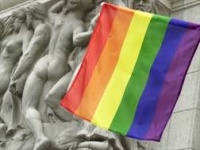Difference between revisions of "Early European LGBTQ Activists"
| Line 50: | Line 50: | ||
'''Norway''' | '''Norway''' | ||
| − | + | * [[Karen Christine Friele]] | |
'''Spain''' | '''Spain''' | ||
Revision as of 15:41, 4 May 2019
Europe contains a rich history of LGBTQ activism that has formed the basis of contemporary activity in the fields of literature, the arts, journalism, and politics throughout the world. Much of this progress has been based on the work of intellectuals, writers, and artists of the late 19th and early 20th centuries. These individuals took tremendous personal risks in a world that was hostile to homosexual thinking and activity - many of their works were banned or heavily censored.
Nevertheless, their efforts form a solid foundation of history of the LGBTQ movement that must be learned, respected, and cherished.
For example:
- Do you know the story of the founding of the first LGBTQ newspaper in the world?
- Which Out German was the first LGBTQ activist in the world?
- Who was Italy's first gay intellectual?
- Who is considered the grandfather of LGBTQ activism in France?
- Who founded the first Spanish LGBTQ activist group?
- Which Netherland's artist was knighted for founding the first arts group in his country?
Answers to these questions, and insight to much more, can be found in the following biographies:
Austria
Denmark
France
Germany
- Adolf Brand
- Ernst Burchard
- Kurt Hiller
- Dr. Magnus Hirschfeld
- Karl Heinrich Ulrichs
- Bruno Vogel
- Charlotte Von Mahlsdorf
Italy
Norway
Spain
Sweden
The Netherlands
- Willem Arondeus
- Nico Engelschman
- Marie Jacobus Johannes Exler
- Joannes Henri Francois
- Squire Jacob Anton Schorer
See Also
- Transgender Activists
- Global LGBTQ HIV/AIDS Activists
- Intersex Activists
- Bisexual Activists
- Feminist Activists Who Identify as Lesbian, Bisexual or Transgender
- Animal Rights Activism and the LGBTQ Community

